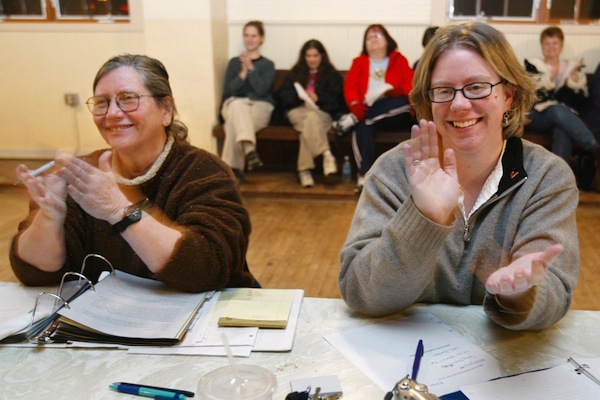With the holiday season now upon us, we are constantly reminded of the seasonal cliche: “the meaning of Christmas.” From Charles Dickens to Charles Schultz, Dr. Seuss to at least one spiritual leader in one’s life, there have been enough lessons about peace on Earth and good will towards man to last generations. Yet every year, the red tag sales come back to taunt us with capitalism’s own interpretation of holiday cheer.
Christmas is commercial. Anyone can see it in the Black Friday bargains and winter blow-out sales, the million-dollar holiday jingles and endless stream of catalogues brimming with every sellable item for every possible person in our lives. We’ve heard that this consumerist attitude corrupts our morals, but it’s bigger even than that.
Toys, clothes, electronics and stocking-stuffers take energy and resources to make. With Earth’s population now at seven billion, that leaves a lot less resources for a lot more people. More people on the planet means less space per person, at least on average. It goes without saying that people require basic services like food and water, which in turn requires energy. But so do the companies that manufacture toys and the like.
These are not isolated events. According to the Worldwatch Institute, as of 2010, the most developed nations took up 68 percent of the world’s energy. Case in point: in a recent New York Times ad campaign, the apparel retailer, Patagonia, traced the environmental history of one of its products, measuring 135 liters of water for a single polyester jacket. That’s enough to meet the three-glass-a-day requirement for 45 people.
Not only does over-consumerism strain environmental resources, it degenerates fundamental human rights. That new phone on everybody’s wish list? The mineral in its metal very likely came from illegal mining operations in Africa. Columbite-tantalite, which, when refined, produces a heat-resistant metal powder prized for its technological uses, has long faced exploitation by rebels in Uganda and Rwanda to fund war crimes, Human Rights Watch researchers report. The thing is, a great deal of the world’s supply of tantalite comes from safe, legitimate mines in Canada, Australia, and Brazil; phone companies would not look to blood-soaked options if it weren’t for increasing demand for their product.
It’s not just cell phones, either. How many clothing labels say “Made in China?” Sweatshops aren’t a thing of the past: they’re all around us, in the clothes we buy and shoes we wear. The US Department of Labor defines sweatshops as any factory that violates two or more labor laws, including child labor restrictions. According to the National Labor Organization, across the globe, an estimated 250 million children between the ages of five and 14 are put to work in developing nations. In other words, by US standards, at least 250 million people in the world are employed in sweatshops, the monolith of human rights violations.
Now that the reality of Christmas consumerism has sunk in, what can one person do to celebrate the gift of giving without the environmental and social repercussions? The answer is sustainable spending. One does not need to forego shopping completely, but maintaining an awareness of what and where one buys can make an enormous difference.
Instead of hitting the mall, where flocks of people will make shopping sprees miserable anyway, make gift lists at stores that support international development. For instance, Plowsharing Crafts, a nonprofit in the Delmar Loop, offers hundreds of artisan gift options from over 40 developing countries. Look for the words “fair trade,” which denote companies that pay and treat their workers fairly. Fair trade also comes with environmental benefits, since small farmers tend to use organic methods and artisans work with material native to their region.
From handmade home decor to organically dyed scarves, Plowsharing Crafts and similar shops line their shelves with goods that give people in struggling nations, especially women, the means to support themselves. Another shopping option is the St. Louis Fair Trade Market at Manchester United Methodist Church, one of the largest fair trade bazaars in the nation. Though it’s too late to check it out this year (it takes place through the week of Thanksgiving), it’s worth keeping in mind for next year’s round of holiday shopping. Even Hallmark has its fair trade counterparts; this year, choose Unicef over store-bought greeting cards and provide global humanitarian relief for children in the process.
Fair trade isn’t the only answer to the buy-it-all mantra of the holidays. Choosing local retailers over chain stores supports the community in more ways than one, especially when said retailers donate their profits to charity, as the Foster and Adoptive Care Coalition’s [Re]Fresh resale store on Brentwood does. The Scholar Shop, another resale store located on Clayton Road, also uses its profits to fund a greater cause: providing post-secondary education opportunities to those who otherwise would not be financially viable for them. Across the board, resale stores provide excellent shopping alternatives, offering all the luxuries of major brands at affordable prices by recycling clothing and accessories instead of sending them straight to the landfill.
Then again, one needn’t spend anything at all. There are other ways of recycling, and any online search for a Do-It-Yourself project yields thousands of results. Sometimes all it takes to make a meaningful present is a quick sweep through the house–old clothing scraps can transform into twist-tie scarves or even whole new garments with the help of a sewing machine and a little creativity. Leftover ingredients can become holiday treats, photos can go into personalized albums or digital scrapbooks…it may sound like a cliche, but who doesn’t love some imaginative flair in their presents?
If one absolutely must buy something, consider making a donation to a charity in somebody’s honor, such as the Humane Society or Heifer International. The latter provides families in developing nations with animals as well as training over how to care for them, supplying them both with a stable food source and an opportunity for self-reliance. Just a $10 donation can purchase a share of a sheep or goat for a struggling family.
Buying isn’t a bad thing–in fact, in developing nations, businesses help otherwise at-risk get families on their feet. Closer to home, small businesses support the local economy and, in some cases, give back to the community. So this year, don’t let those tired expressions of the gift of giving go unrecognized–shop sustainably, and the Christmas cheer will follow. Christmas only happens once a year, but environmental impact is forever. #










